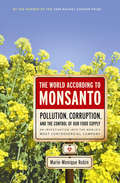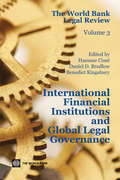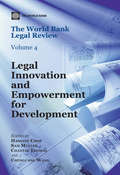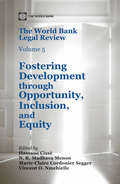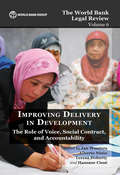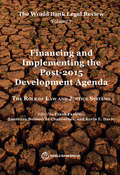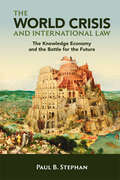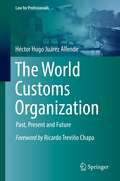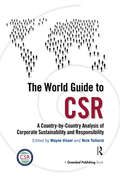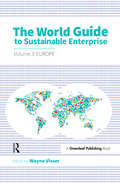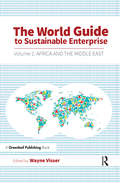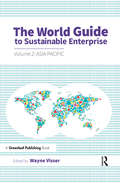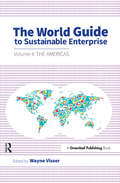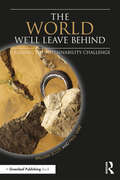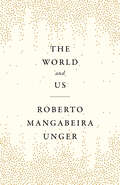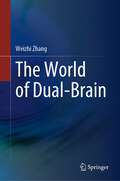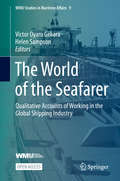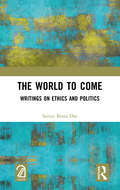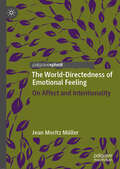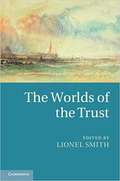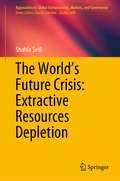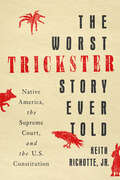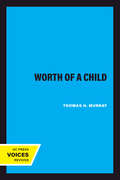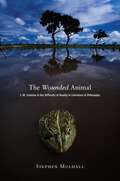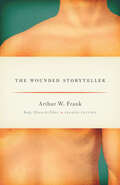- Table View
- List View
The World According to Monsanto: Pollution, Corruption, and the Control of Our Food Supply
by Marie-Monique RobinAn investigation of the massive agribusiness company, from a winner of the Rachel Carson Prize: &“Well supported by wide-ranging scientific evidence.&” —Kirkus Reviews The result of a remarkable three-year-long investigation that took award-winning journalist and documentary filmmaker Marie-Monique Robin across four continents, The World According to Monsanto tells the little-known yet shocking story of this agribusiness giant—the world&’s leading producer of GMOs (genetically modified organisms)—and how its new &“green&” face is no less malign than its PCB- and Agent Orange–soaked past. Robin reports that, following its long history of manufacturing hazardous chemicals and lethal herbicides, Monsanto is now marketing itself as a &“life sciences&” company, seemingly convinced about the virtues of sustainable development. However, Monsanto now controls the majority of the yield of the world&’s genetically modified corn and soy—ingredients found in more than 95 percent of American households—and its alarming legal and political tactics to maintain this monopoly are the subject of worldwide concern. Released alongside the documentary film of the same name, The World According to Monsanto is sure to change the way we think about food safety and the corporate control of our food supply.
The World Bank Legal Review
by Hassane Cissé Daniel D. Bradlow Benedict KingsburyThis books focuses on the legal challenges and opportunities for International Financial Institutions in the post-crisis world. It includes contributions from academics, practitioners and Bank staff. The contributions cover a broad array of issues, included governance reform and constitutional framework of IFIs, privileges and immunities, responsibility of international organizations, issues related to fragile and conflict-affected states, climate finance, and the recent financial crisis. The book is organized in three main areas, namely (i) Law of International Organizations: Issues Confronting IFIs; (ii) Legal Obligations and Institutions of Developing Countries: Rethinking Approaches of IFIs; and (iii) International Finance and the Challenges of Regulatory Governance.
The World Bank Legal Review
by Hassane Cissé Sam Muller Chantal Thomas Chenguang WangMuch has been written about the role of law in furthering development. More analysis and debate is needed to understand more fully the true nature of this role. The World Bank Legal Review collects much of this debate and analysis, contributed by scholars and practitioners from around the world. The subtitle of the volume, Legal Innovation and Empowerment for Development, focuses attention on how the law can respond to the challenges posed to development in a world slowly emerging from a protracted economic crisis. Innovation in law means new strategies and ways of thinking about what the law can do in the development realm. Empowerment can mean many things, such as how to place the law into the hands of the poor. The two concepts are linked by their relevance to the future of law as a force for development. This volume contains essays that examine legal innovations and efforts at empowerment worldwide, in individual countries and in the broader international system more generally. Contributions have been collected from scholars and practitioners from across the world. The World Bank Legal Review is an important contribution to the scholarship of law and development.
The World Bank Legal Review
by Hassane CisséThis volume will explore the potentially transformative role of effective laws and legal institutions in providing people with more opportunity that is both inclusive and equitable. Laws, legal frameworks and judicial institutions can create opportunity by providing the space to build human capital and assets, create jobs, and encourage individuals and organizations to make productive investments based on a greater sense of stability. They can also promote inclusion by advancing access to jobs and expanding the reach and quality of services including access to justice as well as promote equity by supporting equal opportunities, promoting open and accountable governance, and effective judicial and legal institutions. The objective is to shift focus to laws, legal frameworks and judicial institutions. To this end, submissions will explore the potentially transformative role of effective laws and legal institutions in providing people with more opportunity that is both inclusive and equitable.
The World Bank Legal Review Volume 6 Improving Delivery in Development
by Alberto Ninio Teresa Doherty Cisse' Jan WoutersMany developing countries have the capacity to develop broad development policy directions and formulate development programs that are logical and consistent, but these do not obtain the desired or targeted results because of challenges in the delivery system. It is increasingly apparent that development efforts must be carefully crafted and targeted in the right way to achieve the most effective results in an efficient manner. Recent literature in development studies evidence the important role of 'delivery' in actualizing positive and efficient development impact. Improving delivery and development impact requires a multidisciplinary approach. Development practitioners devoted to rule of law and justice must conjoin their efforts, concepts, tools and knowledge with experts from various disciplines so as to shape a delivery system that adds economic and social value to ultimate beneficiaries of development. In the foregoing light, the book brings together the diverse perspectives of development experts, international lawyers, academics, researchers, legal practitioners, public and civil servants, and other professionals, in order to explore the values of voice, social contract and accountability, and thereby address the following issue: How can law and justice tools, concepts and knowledge - when anchored in values such as voice, social contract and accountability - shape a delivery system that adds economic and social value to ultimate beneficiaries of development? The book revolves around a discussion of the three values of voice, social contract, and accountability as they relate to the role and function of law, rule of law, justice, judicial systems and other related areas, in delivering development impact. Additionally, the book departs from the legal and includes other multidisciplinary approaches in its discussion of the three values and their impact on delivery in development. The range of issues covered by the book include those relating to human rights, government policy, urban development, resource management, gender, social rights, economic reforms, financial empowerment, opportunity creation, governance, urban law, sustainable development and anti-corruption.
The World Bank Legal Review, Volume 7 Financing and Implementing the Post-2015 Development Agenda: The Role of Law and Justice Systems
by Kevin E. Davis Laurence Boisson de Chazournes Frank FarielloThe newly adopted post-2015 development agenda is centered on 17 sustainable development goals to be reached by 2030. This volume of the World Bank Legal Review looks at how law and justice systems can support the financing and implementation of these goals, including the role of the rule of law and economic and social rights. The contributors, including legal scholars, development practitioners, and financial experts, analyze the goals, explore ways in which they can be achieved, and examine ways that recent relevant law and justice programs have worked. A wide array of topics are covered, from the legal aspects of collecting and monitoring vital data, to improving legal identity programs, to creating innovative health care regulation, to legal and judicial reform, to providing private sector "financing of public education projects to the provision of global public goods. Additionally, a special section on Europe looks at financial crisis management, enforcement of court decisions and the workings of the European Court of Justice. The opportunities and challenges of the 2030 agenda are many. This volume looks at both from multiple perspectives, demonstrating how sustainable development can go forward in a way in which everyone benefits.
The World Crisis and International Law: The Knowledge Economy and the Battle for the Future
by Paul B. StephanThe knowledge economy, a seeming wonder for the world, has caused unintended harms that threaten peace and prosperity and undo international cooperation and the international rule of law. The world faces threats of war, pandemics, growing domestic political discord, climate change, disruption of international trade and investment, immigration, and the pollution of cyberspace, just as international law increasingly falls short as a tool for managing these challenges. Prosperity dependent on meritocracy, open borders, international economic freedom, and a wide-open Internet has met its limits, with international law one of the first casualties. Any effective response to these threats must reflect the pathway by which these perils arrive. Part of the answer to these challenges, Paul B. Stephan argues, must include a re-conception of international law as arising out of pragmatic and limited experiments by states, rather than as grand projects to remake and redeem the world.
The World Customs Organization: Past, Present and Future (Law for Professionals)
by Héctor Hugo Juárez AllendeThis book will take the reader through the past, the present, and into the future of the flagship institution of the international customs community: the World Customs Organization (WCO). The purpose is to present to the reader, in a comprehensive, orderly, and synthetic manner, the enormous contributions that this prestigious and recognized institution has been making to the secure growth of global international trade. In the development of the text, special consideration has been given to the relevant instruments in day-to-day customs work, which constitute the bases of the WCO (the Harmonized System Convention, the Revised Kyoto Convention, and the SAFE Framework of Standards, among many others), as well as those issues that are currently of specific interest to the global customs community (cross-border e-commerce, trade facilitation, and authorized economic operator, to mention but a few), trying to reconcile the various practical aspects of customs operations with their theoretical underpinnings. In the final part, the book turns to the future of customs, analyzing the most pressing challenges presented by technological advances, including the Internet of Things, artificial intelligence, 3D printing, and blockchain. In short, this book will be of great interest to all foreign trade operators, mainly to customs officials, customs brokers, carriers and international forwarding agents, managers of importing and exporting companies, as well as all those (professionals and students) who wish to deepen their knowledge of the exciting world of customs and international trade.
The World Guide to CSR: A Country-by-Country Analysis of Corporate Sustainability and Responsibility
by Nick Tolhurst Wayne VisserThe World Guide to CSR is the first book to provide comparable national profiles that describe the evolution and practice of Corporate Sustainability and Responsibility (CSR) for 58 countries and 5 global regions. Each regional and national profile includes key information about the relevant CSR history, country-specific issues, trends, research and leading organizations. The purpose of the book is to give CSR professionals (including managers, consultants, academics and NGOs focusing on the social, environmental and ethical responsibilities of business) a quick reference guide to CSR in different regional and national contexts. The need for the book is premised on the fact that CSR professionals and researchers more often than not have a multinational remit and are required to benchmark performance internationally, but find that country-specific CSR information is ad hoc, limited or non-existent. Even where national CSR research exists, it is often hidden in academic journals that practitioners cannot access or do not have the time or inclination to read. The book is an edited volume, with expert contributors from around the world, all of whom have been screened and selected on the basis of their qualifications and experience in CSR. Each regional/country profile includes the following subsections:CSR in context Priority issues Trends Legislation and codes Organizations Case studies Educational institutions References This unique resource will be an essential acquisition for all organisations who need to benchmark their CSR strategies throughout different regions and cultures and want the best possible intelligence on the key issues and concerns relating to corporate social responsibility in all of the markets in which they operate.
The World Guide to Sustainable Enterprise - Volume 3: Europe
by Wayne VisserThe World Guide to Sustainable Enterprise is the first comprehensive global compendium that clearly describes the national approaches to sustainable enterprise. Through a systematic review of each country, this quick-to-access reference guide showcases the similarities and differences in each region. Every country profile includes key information about the relevant history, country-specific issues, trends, research, and the leading organizations operating in the field as well as best-practice case studies. The guide comprises four volumes, each dedicated to a specific region of the world. In a world where organizations are working increasingly across national and regional boundaries and research takes a joined-up and international approach, this book is an essential guide for practitioners and researchers in the disciplines of business sustainability, social enterprise and corporate responsibility. The first of its kind, this reference book provides the reader with a unique insight into what is the current state-of-play in each country. Each edited volume provides expert contributions from around the world; the contributors have been selected on the basis of their knowledge of the country and their clear experience in sustainable enterprise. Each regional/country profile includes the following subsections: Sustainable Enterprise in context; Priority issues; Trends; Government policies; Case studies; Further resources; and References. This unique resource will be an essential acquisition for all organizations who need to benchmark their sustainable enterprise strategies throughout different regions and cultures and want the best possible intelligence on the key issues and concerns relating to sustainable business and social responsibility in all of the markets in which they operate. It provides a useful companion reference collection to the World Guide to CSR, also edited by Wayne Visser. The full Four Volume Set of The World Guide to Sustainable Enterprise is available for purchase as a single item at a 25% discounted rate.
The World Guide to Sustainable Enterprise: Volume 1: Africa and Middle East
by Wayne VisserThe World Guide to Sustainable Enterprise is the first comprehensive global compendium that clearly describes the national approaches to sustainable enterprise. Through a systematic review of each country, this quick-to-access reference guide showcases the similarities and differences in each region. Every country profile includes key information about the relevant history, country-specific issues, trends, research, and the leading organizations operating in the field as well as best-practice case studies. The guide comprises four volumes, each dedicated to a specific region of the world. In a world where organizations are working increasingly across national and regional boundaries and research takes a joined-up and international approach, this book is an essential guide for practitioners and researchers in the disciplines of business sustainability, social enterprise and corporate responsibility. The first of its kind, this reference book provides the reader with a unique insight into what is the current state-of-play in each country. Each edited volume provides expert contributions from around the world; the contributors have been selected on the basis of their knowledge of the country and their clear experience in sustainable enterprise. Each regional/country profile includes the following subsections: Sustainable Enterprise in context; Priority issues; Trends; Government policies; Case studies; Further resources; and References. This unique resource will be an essential acquisition for all organizations who need to benchmark their sustainable enterprise strategies throughout different regions and cultures and want the best possible intelligence on the key issues and concerns relating to sustainable business and social responsibility in all of the markets in which they operate. It provides a useful companion reference collection to The World Guide to CSR, also edited by Wayne Visser. The full Four Volume Set of The World Guide to Sustainable Enterprise is available for purchase as a single item at a 25% discounted rate.
The World Guide to Sustainable Enterprise: Volume 2: Asia Pacific
by Wayne VisserThe World Guide to Sustainable Enterprise is the first comprehensive global compendium that clearly describes the national approaches to sustainable enterprise. Through a systematic review of each country, this quick-to-access reference guide showcases the similarities and differences in each region. Every country profile includes key information about the relevant history, country-specific issues, trends, research, and the leading organizations operating in the field as well as best-practice case studies. The guide comprises four volumes, each dedicated to a specific region of the world. In a world where organizations are working increasingly across national and regional boundaries and research takes a joined-up and international approach, this book is an essential guide for practitioners and researchers in the disciplines of business sustainability, social enterprise and corporate responsibility. The first of its kind, this reference book provides the reader with a unique insight into what is the current state-of-play in each country. Each edited volume provides expert contributions from around the world; the contributors have been selected on the basis of their knowledge of the country and their clear experience in sustainable enterprise. Each regional/country profile includes the following subsections: Sustainable Enterprise in context; Priority issues; Trends; Government policies; Case studies; Further resources; and References. This unique resource will be an essential acquisition for all organizations who need to benchmark their sustainable enterprise strategies throughout different regions and cultures and want the best possible intelligence on the key issues and concerns relating to sustainable business and social responsibility in all of the markets in which they operate. It provides a useful companion reference collection to the World Guide to CSR, also edited by Wayne Visser. The full Four Volume Set of The World Guide to Sustainable Enterprise is available for purchase as a single item at a 25% discounted rate.
The World Guide to Sustainable Enterprise: Volume 4: the Americas
by Wayne VisserThe World Guide to Sustainable Enterprise is the first comprehensive global compendium that clearly describes the national approaches to sustainable enterprise. Through a systematic review of each country, this quick-to-access reference guide showcases the similarities and differences in each region. Every country profile includes key information about the relevant history, country-specific issues, trends, research, and the leading organizations operating in the field as well as best-practice case studies. The guide comprises four volumes, each dedicated to a specific region of the world. In a world where organizations are working increasingly across national and regional boundaries and research takes a joined-up and international approach, this book is an essential guide for practitioners and researchers in the disciplines of business sustainability, social enterprise and corporate responsibility. The first of its kind, this reference book provides the reader with a unique insight into what is the current state-of-play in each country. Each edited volume provides expert contributions from around the world; the contributors have been selected on the basis of their knowledge of the country and their clear experience in sustainable enterprise. Each regional/country profile includes the following subsections: Sustainable Enterprise in context; Priority issues; Trends; Government policies; Case studies; Further resources; and References. This unique resource will be an essential acquisition for all organizations who need to benchmark their sustainable enterprise strategies throughout different regions and cultures and want the best possible intelligence on the key issues and concerns relating to sustainable business and social responsibility in all of the markets in which they operate. It provides a useful companion reference collection to the World Guide to CSR, also edited by Wayne Visser. The full Four Volume Set of The World Guide to Sustainable Enterprise is available for purchase as a single item at a 25% discounted rate.
The World We'll Leave Behind: Grasping the Sustainability Challenge
by William Scott Paul VareIt is now clear that human activity has influenced how the biosphere supports life on Earth, and given rise to a set of connected environmental and social problems. In response to the challenge that these problems present, a series of international conferences and summits led to discussions of sustainable development and the core dilemma of our time: How can we all live well, now and in the future, without compromising the ability of the planet to enable us all to live well? This book identifies the main issues and challenges we now face; it explains the ideas that underpin them and their interconnection, and discusses a range of strategies through which they might be addressed and possibly resolved. These cover things that governments might do, what businesses and large organisations can contribute, and the scope for individuals, families and communities to get involved. This book is for everyone who cares about such challenges, and wants to know more about them.
The World and Us
by Roberto Mangabeira Unger"A restless visionary striving to realize the highest aspirations of modernity itself."–New York TimesA radical re-envisioning of the human condition by the acclaimed Brazilian philosopherIn The World and Us, Roberto Mangabeira Unger sets out to reinvent philosophy. His central theme is our transcendence, everything in our existence points beyond itself, and its relation to our finitude: everything that surrounds us, and we ourselves, are flawed and ephemeral.He asks how we can live so that we die only once, instead of dying many small deaths; how we can breathe new life and new meaning into the revolutionary movement that has aroused humanity for the last three centuries, but that is now weakened and disoriented; and how we can make sense of ourselves without claiming for human beings a miraculous exception to the general regime of nature. For Unger, philosophy must be the mind on fire, insisting on our prerogative to speak to what matters most.From this perspective, he redefines each of the traditional parts of philosophy, from ontology and epistemology to ethics and politics. He turns moral philosophy into an exploration of the contest between the two most powerful contemporary moral visions: an ethic of self-fashioning and non-conformity, and an ethic of human connection and responsibility.And he turns political philosophy into a program of deep freedom, showing how to democratize the market economy, energize democratic politics, and give the individual worker and citizen the means to flourish amid permanent innovation.
The World of Dual-Brain
by Weizhi ZhangThis book leaves the template of the inertia of natural human society and traditional ideological thinking, to illustrate the mechanism of the generation of the Sociality Brain and to explore the construction path of the human-computer symbiosis order. At the same time, this book proposes concepts including ‘wisdom sharing system’, ‘the Sociality Brain’, ‘dual-brain world’, ‘off-site economic civilization’, ‘basic contradictions in the intelligent world’, and ‘class analysis and division of the dual-brain world’, etc. This is a philosophical thinking about the intelligent world beyond the categories of natural human society and biological brain.
The World of the Seafarer: Qualitative Accounts of Working in the Global Shipping Industry (WMU Studies in Maritime Affairs #9)
by Victor Oyaro Gekara Helen SampsonThis open access book constitutes an ethnographic mosaic which depicts the contextual complexities of the life and work of seafarers who are employed in the international merchant cargo fleet. The collection is based upon the observations and interviews of researchers in multiple disciplines. It is woven together to offer a richly detailed insight into the ways in which a complex global industry operates internationally. The book covers issues to do with career decisions and recruitment, gender, life and work on board multinational vessels, health and safety issues, the regulation of the industry, shipboard roles and role conflict, and the representation of workers. It will be of considerable interest to all students globally who are studying for professional seafaring qualifications, to graduate students studying for masters courses in ship and port management, and to welfare professionals and policy makers. It is of special interest to those connected to the shipping industry who specialize in issues relating to 'the human element' and will serve as a paradigm defining text in this area.
The World to Come: Writings on Ethics and Politics
by Saitya Brata DasAt the heart of the messianic thinking lies an unconditional idea of redemption. The messianic idea of unconditionality is based upon a qualitative distinction between the unredeemed world and the world to come. It is fundamental to this messianic idea that this distinction can't be grasped as transition or mediation. Taking his inspiration from thinkers like Jacques Derrida, Emmanuel Lévinas, Walter Benjamin and Franz Rosenzweig, Saitya Brata Das renews here this task of the unconditional, the task of thinking “the advent of pure future that is always to come", unenclosed in the bounds of law or in the cages of the “worldly”. He thereby draws profound ethico-political implications from such a thought that opens up the infinitude of the future from the heart of our finitude, and shows that such thinking is the very task of our time.
The World-Directedness of Emotional Feeling: On Affect and Intentionality
by Jean Moritz MüllerThis book engages with what are widely recognized as the two core dimensions of emotion. When we are afraid, glad or disappointed, we feel a certain way; moreover, our emotion is intentional or directed at something: we are afraid of something, glad or disappointed about something. Connecting with a vital strand of recent philosophical thinking, Müller conceives of these two aspects of emotion as unified. Examining different possible ways of developing the view that the feeling dimension of emotion is itself intentional, he argues against the currently popular view that it is a form of perception-like receptivity to value. Müller instead proposes that emotional feeling is a specific type of response to value, an affective ‘position-taking’. This alternative conceives of emotional feeling as intimately related to our cares and concerns. While situating itself within the analytic-philosophical debate on emotion, the discussion crucially draws on ideas from the early phenomenological tradition and thinks past the theoretical strictures of many contemporary approaches to this subject. The result is an innovative view of emotional feeling as a thoroughly personal form of engagement with value.
The Worlds of the Trust
by Lionel SmithDespite the common belief that they are found only in the common law tradition, trusts have long been known in mixed jurisdictions even where they have a civilian law of property. Trusts have now been introduced by legislation in a number of civilian jurisdictions, such as France and China. Other recent developments include the reception of foreign trusts through private international law in Italy and Switzerland and the inclusion of a chapter on trusts in Europe's Draft Common Frame of Reference. As a result, there is a growing interest in the ways in which the trust can be accommodated in civil law systems. This collection explores this question, as well as general issues such as the juridical nature of the trust, the role and qualifications of the trustee and particular developments in specific jurisdictions.
The World’s Future Crisis: Extractive Resources Depletion (Approaches to Global Sustainability, Markets, and Governance)
by Shahla SeifiThis book focuses mainly on strategic decision making at a global level, which is rarely considered in approaches to sustainability. This book makes a unique contribution as the work looks at global consequences of mineral exhaustion and steps that can be taken to alleviate the impending problems. This book highlights how sustainability has become one of the most important issues for businesses, governments and society at large. This book explores the topic of sustainability as one that is under much debate as to what it actually is and how it can be achieved, but it is completely evident that the resources of the planet are fixed in quantity, and once used, cannot be reused except through being reused in one form or another. This is particularly true of the mineral resources of the planet. These are finite in quantity, and once fully extracted, extra quantities are no longer available for future use. This book argues and presents evidence that the remaining mineral resources are diminishing significantly and heading towards exhaustion. Once mined and consumed, they are no longer available for future use other than what can be recycled and reused. This book demonstrates that future scarcity means that best use must be made of what exists, as sustainability depends upon this, and best use is defined as utility rather than economic value, which must be considered at a global level rather than a national level. Moreover, sustainability depends upon both availability in the present and in the future, so the use of resources requires attention to the future as well as to the present. This book investigates the alternative methods of achieving the global distribution of these mineral resources and proposes an optimum solution. This book adds to the discourse through the understanding of the importance of the depletion and finiteness of raw materials and their use for the present and the future, in order to achieve and maintain sustainability.
The Worst Trickster Story Ever Told: Native America, the Supreme Court, and the U.S. Constitution
by Keith Richotte Jr.When did the federal government's self-appointed, essentially limitless authority over Native America become constitutional? The story they have chosen to tell is wrong. It is time to tell a better story. Thus begins Keith Richotte's playful, unconventional look at Native American and Supreme Court history. At the center of his account is the mystery of a massive federal authority called plenary power. When the Supreme Court first embraced plenary power in the 1880s it did not bother to seek any legal justification for the decision – it was simply rooted in racist ideas about tribal nations. By the 21st century, however, the Supreme Court was telling a different story, with opinions crediting the U.S. Constitution as the explicit source of federal plenary power. So, when did the Supreme Court change its story? Just as importantly, why did it change its story? And what does this change mean for Native America, the Supreme Court, and the rule of law? In a unique twist on legal and Native history, Richotte uses the genre of trickster stories to uncover the answers to these questions and offer an alternative understanding. The Worst Trickster Story Ever Told provides an irreverent, entertaining synthesis of Native American legal history across more than 100 years, reflecting on race, power, and sovereignty along the way. By embracing the subtle, winking wisdom of trickster stories, and centering the Indigenous perspective, Richotte opens up new avenues for understanding this history. We are able, then, to imagine a future that is more just, equitable, and that better fulfills the text and the spirit of the Constitution.
The Worth of a Child
by Thomas H. MurrayThomas Murray's graceful and humane book illuminates one of the most morally complex areas of everyday life: the relationship between parents and children. What do children mean to their parents, and how far do parental obligations go? What, from the beginning of life to its end, is the worth of a child?Ethicist Murray leaves the rarefied air of abstract moral philosophy in order to reflect on the moral perplexities of ordinary life and ordinary people. Observing that abstract moral terms such as altruism and selfishness can be buried in the everyday doings of families, he maintains that ethical theory needs a richer description than it now has of the moral life of parents and children. How far should adults go in their quest for children? What options are available to women who do not want to bear a child now? Should couples be allowed to reject a child because of genetic disability or "wrong" gender? How can we weigh the competing claims of the genetic and the rearing parents to a particular child?The Worth of a Child couples impressive learning with a conversational style. Only by getting down to cases, Murray insists, can we reach moral conclusions that are unsentimental, farsighted, and just. In an era of intense public and private acrimony about the place and meaning of "family values," his practical wisdom about extraordinary difficult moral issues offers compelling reading for both experienced and prospective parents, as well as for ethicists, social and behavioral scientists, and legal theorists.
The Wounded Animal: J. M. Coetzee and the Difficulty of Reality in Literature and Philosophy
by Stephen MulhallIn 1997, the Nobel Prize-winning novelist J. M. Coetzee, invited to Princeton University to lecture on the moral status of animals, read a work of fiction about an eminent novelist, Elizabeth Costello, invited to lecture on the moral status of animals at an American college. Coetzee's lectures were published in 1999 as The Lives of Animals, and reappeared in 2003 as part of his novel Elizabeth Costello; and both lectures and novel have attracted the critical attention of a number of influential philosophers--including Peter Singer, Cora Diamond, Stanley Cavell, and John McDowell. In The Wounded Animal, Stephen Mulhall closely examines Coetzee's writings about Costello, and the ways in which philosophers have responded to them, focusing in particular on their powerful presentation of both literature and philosophy as seeking, and failing, to represent reality--in part because of reality's resistance to such projects of understanding, but also because of philosophy's unwillingness to learn from literature how best to acknowledge that resistance. In so doing, Mulhall is led to consider the relations among reason, language, and the imagination, as well as more specific ethical issues concerning the moral status of animals, the meaning of mortality, the nature of evil, and the demands of religion. The ancient quarrel between philosophy and literature here displays undiminished vigor and renewed significance.
The Wounded Storyteller: Body, Illness & Ethics
by Arthur W. FrankUpdated second edition: “A bold and imaginative book which moves our thinking about narratives of illness in new directions.” —Sociology of Heath and IllnessSince it was first published in 1995, The Wounded Storyteller has occupied a unique place in the body of work on illness. A collective portrait of a so-called “remission society” of those who suffer from illness or disability, as well as a cogent analysis of their stories within a larger framework of narrative theory, Arthur W. Frank’s book has reached a large and diverse readership including the ill, medical professionals, and scholars of literary theory.Drawing on the work of such authors as Oliver Sacks, Anatole Broyard, Norman Cousins, and Audre Lorde, as well as from people he met during the years he spent among different illness groups, Frank recounts a stirring collection of illness stories, ranging from the well-known—Gilda Radner’s battle with ovarian cancer—to the private testimonials of people with cancer, chronic fatigue syndrome, and disabilities. Their stories are more than accounts of personal suffering: They abound with moral choices and point to a social ethic.In this new edition Frank adds a preface describing the personal and cultural times when the first edition was written. His new afterword extends the book’s argument significantly, discussing storytelling and experience, other modes of illness narration, and a version of hope that is both realistic and aspirational. Reflecting on his own life during the creation of the first edition and the conclusions of the book itself, he reminds us of the power of storytelling as way to understand our own suffering.“Arthur W. Frank’s second edition of The Wounded Storyteller provides instructions for use of this now-classic text in the study of illness narratives.” —Rita Charon, author of Narrative Medicine“Frank sees the value of illness narratives not so much in solving clinical conundrums as in addressing the question of how to live a good life.” —Christianity Today
